Peter MALONE
Saturday, 18 September 2021 19:19
Murder!
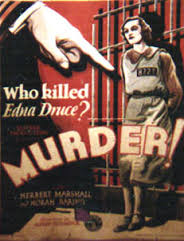
MURDER!
UK, 1930, 104 minutes, Black and white.
Herbert Marshall, Norah Baring, Edward Chapman, Miles Mander, Esme Percy.
Directed by Alfred Hitchcock.
Murder! is one of the earliest sound films made by Hitchcock – and there were complaints that it moved too slowly. The reason given was that Hitchcock was experimenting in the use of sound and the introduction of dialogue.
The film was based on a novel, Enter Sir John, by British Clemence Dane and Australian Helen Simpson (Simpson providing the novel for Hitchcock’s 1949 Under Capricorn).
The plot is familiar enough, but interestingly done, especially with Herbert Marshall in the central role. After a woman is convicted of murder, one of the members of the jury has second thoughts and tries to solve the mystery for himself.
The film has the atmosphere of Hitchcock’s British films and he was to flourish during the 1930s, with such films as The Thirty-Nine? Steps and The Lady Vanishes, culminating in Jamaica Inn and his move to the United States for Rebecca which won the Oscar for best film. He continued his career in the United States for another thirty-six years.
1. A good Hitchcock film? The title and its giving meaning to the film? The theme of murder: how sensational, how much an exploring of murder and character, how much insight into a murder situation? Was the film a good whodunit? Something more?
2. The film was made a year after sound was introduced popularly. Comment on the techniques and use of sound. The staging of the action, the movement of the camera, the focus on faces and profiles, the style of acting and other devices of the early thirties?
3. How enjoyable a murder mystery was this? How did it retain audience interest? Did the film and its plot seem remote? How real did it seem? Why?
4. The impact of the opening murder, the screams, the couple looking out and the incidental comedy, the clues, the police arrival, the girl and her reaction to the murder situation?
5. How well did the film focus on the girl? How much strength of character, her role in the courts admission of guilt, imprisonment? The importance of the reconstruction of the crime and to see the place of the girl?
6. How interesting were the jury scenes and the establishing of guilt or innocence? Comment on the technique of the decision of the various jurors? The idiosyncrasies of the various jurors? Hitchcock’s getting interest in this sequence?
7. How noble a hero was Sir John? From the silent film traditions? Did he seem remote or real? His motivations for justice? His motives for helping the girl?
8. How interesting was the development of reconstructing the crime from the clues? The retaining of audience interest? The humour of interviewing the people and the incidental sequences with particular characters like the landlady?
9. What insight was given into the mind of the murderer? The early sequences of seeing the men in the play, the transvestite aspect, the seeking out of the murderer, the importance of the audition technique, seeing the murderer in his act and in woman's dress, the tightrope walking, the death? The device of his confession for the completion of the play?
10. What insight was given into the girl when the murderer was revealed? Modern overtones to his secret of being mixed blood?
11. How satisfactory was the resolution of the film? The resolution of the plot and the romantic ending? The right ending for this kind of film?
12. What Hitchcock techniques were obvious in this film of 1930? How did they indicate the style of his films in the future?
Published in Movie Reviews
Published in
Movie Reviews
Tagged under
Saturday, 18 September 2021 19:19
Mudlark, The
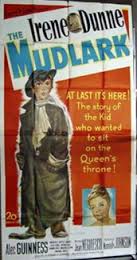
THE MUDLARK
UK/US, 1950, 98 minutes, Black and white.
Irene Dunne, Alec Guinness, Andrew Ray, Beatrice Campbell, Finlay Currie, Anthony Steel, Raymond Lovell, Marjorie Fielding, Constance Smith, Edward Rigby.
Directed by Jean Negulesco.
The Mudlark is a very fine film, interesting and entertaining.
Irene Dunne gives a tour-de-force performance as the ageing Queen Victoria, living in seclusion after the death of Prince Albert. Alec Guinness, near the beginning of his career, gives a very fine performance as Benjamin Disraeli, especially in a strong political speech at the end of the film. Andrew Ray was a character actor for the next forty years but this was his first film as Wheeler, the little boy who scavenged on the banks of the Thames for food, discovers a medallion with Queen Victoria’s portrait on it and is told that she is the mother of all people. He decides that he would like to visit her and gets into the palace grounds. He has an audience with her – and, according to the story, is able to persuade her to come out of seclusion. Finlay Currie plays John Brown (the role played by Billy Connolly in Mrs Brown). Constance Smith and Anthony Steel at the beginning of their careers are a young couple.
Queen Victoria had been portrayed several times by Anna Neagle at this stage. Irene Dunne portrayed the queen in her old age. Judi Dench in an Oscar-nominated performance was excellent in Mrs Brown. Kathy Bates did a rather satiric turn as Queen Victoria in Jackie Chan’s Around the World in Eighty Days.
The film was directed by Jean Negulesco, who had directed a number of thrillers at this time and was soon to move into lush Technicolor Cinemascope films like Three Coins in the Fountain. It was written by Nunnally Johnson, veteran writer at 20th Century- Fox.
The Mudlark is still well worth seeing.
1. How entertaining was this film? The nature of its charm and its values?
2. The black and white photography, style of 1950? The British background of feeling and the focus on Queen Victoria and the Victorian era?
3. The nature of the legend, the footnote to history? The presentation of the historical period, fantasy about this period? The historical facts, the human themes?
4. The title's focus on Wheeler as the mudlark? The details of his way of life and poverty in the London docks, the pickings from dead men, the gangs of boys, the finding of the medal and its impact on his trying to sell it to the broker, the fight between the boys and its being, thrown in the river?
5. Why was the medallion so important? The motherly picture of Queen Victoria and its effect on Wheeler? The panic at its being thrown into the river? His desire for the mother picture, his inability to get it? The significance of the chat with the old man who rescued him? Putting ideas into his head to see Queen Victoria? Audience response to him and his quest? How sympathetic a boy?
6. What motivated him to go to Windsor? The humour of the sequences of his being outside the walls, the gates, his ability to slip in? their telling him who it was? Was the audience glad he got inside?
7. His discovery of a different place, different people, the maids and their chatter as they cleaned the dining room? The Irishman and his talk of burning down the castle? Wheeler's hiding behind the curtains?
8. The melodrama of the discovery, the meal, Queen Victoria telling her story? Hearing the boy? The reaction of Nasby? The police? the impact on Wheeler, too strong for a young boy? The interrogation, the imprisonment, the friends disowning him and yet the boy discussing the whole project with Wheeler despite the police?
9. How well did the film present the way of life of Queen Victoria? Her personality? Her retirement and behaviour and the traditions of English royalty? As an old woman, as a women? The nature of her retirement? Her talk with Disraeli, her meals and socialising within the castle? Her fear and upset? The attempts on her life and her fear? Her petulance in her reaction with people? How accurate was Disraeli’s characterisation of the queen? Did the impressions from this performance tie in with impressions from history? Victoria's retirement as an issue for the politics of England?
10. Disraeli and his role in the film? His style and his role as a politician? His ability to handle the queen? His
exasperation at the queen and his ability to conceal this? His handling of the case of Wheeler? His investigations especially with the guard? His use of the boy in Parliament? How strong a characterisation?
11. The importance of Brown in the film? The Scotsman friend of Prince Albert? His assistance to the queen and her reliance on him? His open advice and criticism of her? His drinking and Disraeli’s and his secretary’s reaction? His kindliness to Wheeler? The humour at his dirking and advising Wheeler? Falling down the hole? Taking Wheeler to the throne room and his sitting on the throne?
12. What was the importance of the subplot of the elopement? did it contribute as regards romance? Victoria’s advice?
13. Victoria’s, forbidding Disraeli's mentioning Wheeler in parliament? Disraeli's disobedience and diplomacy?
14. The importance of Disraeli's long speech? Its content, diplomatic effect on the House of Commons? The dramatic importance of the speech filmed in one take? was it important that the second visit of Wheeler was such a coincidence? At the same time as Disraeli's plea to Victoria?
15. The effect of Wheeler's visit on Victoria? Her motherly response even though she was cross with him? Disraeli's satisfaction?
17. The satisfaction at the end when Victoria visited London? The effect on history?
18. What was the principle human value presented and explored in this film?
19. How valuable was the film in its presentation of history? Its social consent?
Published in Movie Reviews
Published in
Movie Reviews
Tagged under
Saturday, 18 September 2021 19:19
Murder on Flight 502
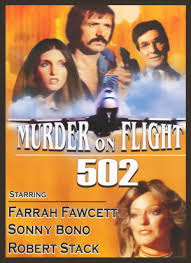
MURDER ON FLIGHT 502
US, 1975, 100 minutes, Colour.
Ralph Bellamy, Polly Bergen, Theodor Bikel, Sonny Bono, Dane Clark, Laraine Day, Fernando Lamas, George Maharis, Farrah Fawcett, Hugh O’Brian?, Molly Picon, Walter Pidgeon, Robert Stack, Brook Adams.
Directed by George Mc Cowan.
This is a comparatively early telemovie – but it seems very familiar in retrospect, with all the disaster films, especially in the Airport tradition. It has many stars from the golden years of Hollywood including Ralph Bellamy, Dane Clark and Laraine Day as well as a number of character actors who spent a lot of time in television films. It looks like a predecessor for Flying High/Airplane, the very funny send-up of this kind of film. Even Robert Stack is the captain in this plane with Farrah Fawcett and Brook Adams as the flight attendants.
It was directed by George Mc Cowan, regular director of many television films during the 1970s. It is really a story of a vendetta rather than what is now considered terrorism.
1. The quality of this telemovie, entertainment value?
2. The various techniques under the plane itself, the passengers and the revelation of character, the build-up to crises in the confined space, the revelation of the murderer and the final conflict? Audience excitement, identification with the passengers and the danger? How was this achieved, how well?
3. The trend of disasters and murder mysteries in the mid-seventies and this film combining both commercially? How successfully? How seriously? Conventional material which is basically forgettable? Or not?
4. The presentation of the pilots and their ability to cope, their action in the predicament?
6. How well delineated were the minor characters, Charlie and the Jewish lady and their companions, Nywroon and his background, Dorothy, Walker, the sophisticated woman and her confrontation with the murderer?
7. The revelation of the murderer? The build-up to his apprehension and his confrontation of people? How convincing, melodramatic?
8. How much human value was there in this film, commercial and surface exploration of values which is satisfactory at a television level?
Published in Movie Reviews
Published in
Movie Reviews
Tagged under
Saturday, 18 September 2021 19:19
Murder to the Tune of the Seven Black Notes
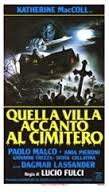
MURDER TO THE TUNE OF THE SEVEN BLACK NOTES
Italy, 1977, 95 minutes, Colour.
Jennifer O’Neill?, Gabriele Ferzetti.
Directed by Lucio Fulci.
An enjoyable Italian murder thriller. It is done in the lavish style of so many of the thrillers, making their own the conventions of the American thriller, that were made in the seventies, for example by Dario Argento. Jennifer O'Neill stars in this film and makes an impact. While the theme is murder, the atmosphere is that of premonition. The film has a good twist for, while we think that there is a murder to be solved from the past, after an hour of the film it appears that the murder is to be that of the heroine and the suspense builds up. Effective and entertaining thriller.
1. The perennial appeal of the murder mystery, thriller aspects, thriller fantasy, the puzzle and the mystery and the solution? How effective was this murder mystery? The puzzle of the murderer and of the victim?
2. The qualities of the Italian production, Italian locations, the score? Atmosphere?
3. The prologue with its dates and places, the premonition and the horror of death? The effect on Virginia? Audience presuppositions about parapsychology, premonitions and E.S.P., visions?
4. Jennifer O'Neill and her style as Virginia? Her background, her marriage, love for her husband? Seeing him off, the vision during her driving and its effect on her? The close-up of the details for the audience? Informing the police, the parapsychologist, the husband? Their varying reactions? The audience being on her side because of having seen the vision? The growing obsession with Virginia, the technique of focusing on her memories of the vision and their fulfilment? The challenge, the build-up of fear? A strong character, her love for her husband, her trying to solve the mystery?
5. The film's presentation of clues: the importance of the body found being that of Angela and Virginia's determination that the victim was an old woman? The professor and his appearance, his photo, the shaving? The search in the house? furniture, yellow cigarettes, etc.? The horse and the photo of Angela and the date? The audience being puzzled along with Virginia?
6. The personality of the husband, genteel, his arrest, the sequences in prison, the photo exonerating him? The change, the truth? The build-up to his walling up Virginia?
7. The parapsychologist and his help, the assistant and her furnishing information? The help at the end?
8. The professor, the gallery, the limp, his disappearance, Virginia's interview with his wife? The presence in the house with the dead woman? The pursuit in the church, his fall, his grabbing at Virginia, his telling the truth in the hospital, the audience making the wrong associations with Virginia? His explanation of the robbery plot and the implications of her husband, the woman and her presence at the house, on the tape recorder, her death?
9. The picture of the police and their scepticism, their help? The parapsychologist and his device to get the police arriving with him?
10. A growing sense of anticipation? Her sister-in-law and the cigarettes, the furniture, Virginia's turning over the bust and finding the letter? The momentum for the finale and the confrontation with her husband, his attack and Virginia's being walled up? The irony of the watch with its notes and Virginia's premonition of the music?
11. The suspense, scares and audience identification with this?
12. The minor characters and their contribution to the plot?
13. The culmination and the effect of the audience being left with her rescue? Audience presuppositions of right and wrong, good and evil? Values communicated through thrillers?
Published in Movie Reviews
Published in
Movie Reviews
Tagged under
Saturday, 18 September 2021 19:19
Murdoch's Gang
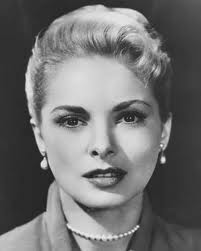
MURDOCH'S GANG
US, 1973, 74 minutes, Colour.
Alex Dreier, Janet Leight, Murray Hamilton, William Daniels.
Directed by Charles S. Dubin.
A pleasant robbery murder mystery. It gives all the evidence of being the pilot for a television series. The star, Alex Dreier, a former newsreader, imitates Raymond Burr and his Perry Mason style. Janet Leigh and Murray Hamilton have quite good central roles. William Daniels is suave as the manservant, inevitable villain. The film is set amongst the wealthy of Los Angeles. It is TV fantasy material, entertainingly done.
1. The popularity of this kind of material for films, television?
2. The conventions of the genre; investigation, mystery, money, violence and murder? Romance? The status of this film and its quality?
3. Colour photography of California? Special effects? The score?
4. The plot for this kind of investigation mystery, the establishing of the detective and his assistants? The mystery situation? The violence, clues? The various characters and suspicions? The double dealing, lies? The tricks to unmask the villains? Audience participation, satisfaction at the solution?
5. Murdoch and his style? the opening and his coming out of prison, his know-how with the prisoners, with authorities, with the television, media? His alibi not being useful? His investigations for Talbot? His treatment of Talbot? Answering phones, doing messages? His henchmen, especially Denver? The humour of the opening sequence with the information about his gang having served prison sentences? The irony of his persuading them to go straight and live profitable lives? The former engagement with Laura? The encounter with Ryker and his safe being robbed? The relationship with Talbot and the hostility? Glenn and the sailing ship? The confrontation with the doctor? The following of intuitions? The unmasking of Bates? An interesting character, idiosyncrasies, flamboyant style?
6. The gang: their backgrounds, their appearance, Denver and his height and mannerisms of speaking, his skills at investigation? The lawyer and his working for Murdoch? The various other members? especially the meetings, robbing the safe, kidnapping Talbot?
7. Laura as enigmatic heroine? The relationship with Murdoch, her precarious marriage to Talbot, the affair with Glenn, the searching of the rooms? The truth about her affair? her decision? The quality of her decision to remain with Talbot? Her not telling Glenn about the money?
8. Talbot, the Californian millionaire, wealthy, eccentric, commanding? The investigation? Suspicions of Laura? The truth about his health? His being kidnapped? The reunion with Laura?
9. Bates as villain? the suave manservant, control? George and his murdering of the man in the hospital? The other members of Bates's group? The confrontation and Bates being caught?
10. Themes of law and order, the administration of justice? Greed? Wealth, health, happiness? Typical television material and themes?
Published in Movie Reviews
Published in
Movie Reviews
Tagged under
Saturday, 18 September 2021 19:19
Mustang Country
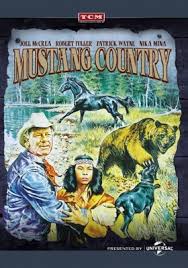
MUSTANG COUNTRY
US, 1976, 79 minutes, Colour.
Joel Mc Crea, Robert Fuller, Patrick Wayne, Nika Mina.
Directed by John C. Champion.
Mustang Country is a minor western – although Joel Mc Crea came out of retirement to make it. He is supported by regular western actors, Robert Fuller and Patrick Wayne. Nika Mina is the young boy but is not particularly strong in his characterisation of a boy lost in the mountains after running away from home, discovered by a rancher who is a rodeo star and who is hunting a wild stallion.
The film was written and directed by John Champion, a writer and producer of westerns including Laramie. This was the only film he directed.
1. A popular film for Western fans? Mustangs, old traditions?
2. The quality of the film as a nostalgic western, especially with Joel McCrea? The quality Joel Mc Crea brought to the film?
3. The county itself; the scenery, the detailed presentation of its beauty, the seasons, the frequent scenes of the wild? Audience liking for the county?
4. The mustangs in the county? their patterns for survival, the horse which defied capture?
5. The portrait of animal struggles in the county? the horse for survival, dogs, the grizzly and its destruction?
6. The portrayal of hunters at the time? The two men who tried their tricks, their failure and their departure?
7. Audience response to Dan? As a man of 1925, a veteran of the old west, a friend of Buffalo Bill? Dan as part of history, as a part of the quest of the pioneers of the west? How sympathetic and interesting a man? The story of his life and his family?
8. The bond between Dan and Luke? The incidents in which the dog was involved? the pathos of its death?
9. The presentation of Dan and his wisdom and skills? In hunting, tracking the mustang, surviving?
10. The character of Niki? Part of the Indian heritage? His helping of Dan? visit to his grandfather and his grandfather’s death? His hunting for survival and tricking of the mustangs?
11. Sequences with the river, the corral in which he tried to trap the horse? The bog and getting the horse out of the bog?
12. The picture of shared work, shared outlooks, the young boy, learning from experience?
13. The climaxes and the build-ups, the sequences of action and drama?
14. The values of this kind of family western tribute to the past and its qualities? Optimism about human nature?
Published in Movie Reviews
Published in
Movie Reviews
Tagged under
Saturday, 18 September 2021 19:19
My Cousin Rachel
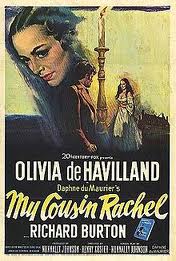
MY COUSIN RACHEL
US, 1952, 98 minutes, Black and white.
Olivia de Havilland, Richard Burton, Audrey Dalton, Ronald Squire, John Sutton.
Directed by Henry Koster.
My Cousin Rachel is based on the novel by Daphne du Maurier. Du Maurier made a great impression with the adaptation of her novel, Rebecca, by Alfred Hitchcock in 1940. He had also adapted her novel, Jamaica Inn. Du Maurier was also famous for providing the short story which became Hitchcock’s The Birds.
This film has the Cornish atmosphere of Rebecca and Jamaica Inn. Richard Burton is a young man who suspects that his cousin was murdered by his new wife, played by an older Olivia de Havilland. The film shows the clash between the young man and the mature woman. It is an interesting psychological study of each character as well as of their interactions – with the touch of the sinister in its atmosphere.
A miniseries of the novel was made in 1983 with Geraldine Chaplin as Rachel and Christopher Gard as Philip Ashley.
This film was directed by Henry Koster who had begun his career in the United States in the late 1930s with a lot of light-hearted films including some Deanna Durbin films. He made a number of social comedies including The Bishop’s Wife. He also had the distinction of making the first Cinemascope film, The Robe. During the 1960s he made a lot of popular entertainments and a series of films with James Stewart, Mr Hobbs Takes a Vacation, Take Her She’s Mine, Dear Brigitte.
1. A typical Daphne Du Maurier entertainment, romantic, melodramatic, of interest especially to female audiences, the 'women's picture' of the past? How? Was it an enjoyable film for all audiences?
2. Comment on the 19th Century atmosphere of the film: attitudes, decor, customs, manners, more restrained ways of thinking and self expression?
3. Did the film offer insight into human nature? Into persons influenced by 19th Century styles? As contrasting with our own styles? How interesting is it to look at persons in a 19th Century context?
4. Philip Ashley: what kind of person was he, Richard Burton's performance and personality? As a 19th century English gentleman? As the hero? What motivated his devotion to Ambrose? His preoccupation with Ambrose?
5. Philip as an Englishman from Cornwall: as influenced by the Cornish atmosphere and landscapes and remoteness? As isolated?
6. Philip's sanity? his view of people, his suspicions, allowing his affections to influence his judgment? Did the audience look at people and situations from Philip's point of view?
7. Rachel, the fact that she does not appear for some time? How suspicious was the audience of her? Why? Did they have any evidence? What kind of person did she seem in herself? As artificial and contrived, as almost too sweet and considerate? d this add to the suspicion? Why?
8. How did Philip see her? How did she allay his suspicions? Why did Philip become fascinated with Rachel? The effect of his illness, his love, his will? His understanding of reality contrasting with hers?
9. The kindness of Rachel during his illness? Audience reaction to this? The contrast with Louise and her family? Louise as a proper fiancee for Philip, the English ordinariness compared with the half English, half Italian Rachel? The attitude of Louise and her family to Rachel?
10. Why was Philip again so suspicious and jealous on his recovery? How obsessed was he with Rachel?
11. The sequence of her death? its impact on the audience, revealing the extent of Philip's obsession?
The shock to realise that Rachel was in good faith? How did this affect audience attitudes towards her death?
12. What future would Philip have as being haunted by Rachel and his killing of her and his false suspicions?
13. How effective was the film in portraying obsessions, suspicions, the fascination or evil, the fascination of good and its effects on a person's life?
Published in Movie Reviews
Published in
Movie Reviews
Tagged under
Saturday, 18 September 2021 19:19
My Darling Clementine
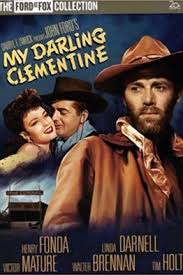
MY DARLING CLEMENTINE
US, 1947, 97 minutes, Black-and-white.
Henry Fonda, Linda Darnell, Victor Mature, Cathy Downs, Walter Brennan, Jim Holt, Ward Bond, Alan Mowbray, John Ireland, Jane Darwell, Grant Withers.
Directed by John Ford.
My Darling Clementine is celebrated Western directors John Ford's version of the gunfight at the O.K.Corral. Ford had been directing westerns for a long time, making a box office breakthrough with critical acclaim with Stagecoach in 1939. He was to win the Oscar for best director in 1940 for The Long Voyage Home and in 1941 for How Green was my Valley. After war service, he began directing westerns again, many of them considered classics with this film, Fort Apache, Wagonmaster, Rio Grande, She Wore a Yellow Ribbon and, in 1956, The Searchers.
Ford employs many of his regulars in supporting roles and relies on Henry Fonda who was his Young Mr Lincoln and was to star in a Custer-like role in Fort Apache. Victor Mature has a good opportunity for impressing audiences with his Doc Holliday.
Audiences will be familiar with the story – brought to the screen 10 years later by John Sturges in The Gunfight at the O.K.Corral with Burt Lancaster and Kirk Douglas.
1. This is considered a classic western. What were its major qualities? How impressive and enjoyable?
2. The film seen as a classic of the forties? Studio backgrounds and locations, western conventions, styles of acting, black and white photography?
3. How well did the film fit into the conventions of the western? The legend and the myth of the American west? The glorification of the west? Criticism? Wyatt Earp and the O.K. Corral? What insight into these characters and events did the film offer?
4. The importance of the background of the cattlemen, Arizona and its opening up, Tombstone as a city, law and order and justice, greed and wealth?
5. The importance of the picture of pioneering? The lawmen within this context? What made them different few the selfish greedy men? The nature of the villains in this kind of west? The inevitability of clash? The human element, the need for survival, the motivation of wealth and power?
6. The portrayal of justice and its administration? Personal justice and authority? The bases for this? The bases for western law and order? The rule of violence and the gun? Personality clashes?
7. The picture of the Earp family? Their closeness as a family, their reputation and background, their attitude towards the cattlemen? Their being injured and their vengeance? Their standing behind the law? Their toughness, for example Wyatt and the Indian? Their role in Tombstone and people's attitude towards them? The help from Doe Holliday? Chihuahua? The influence of Clementine? The overall effect of the Earps' stay in Tombstone?
8. The portrayal of Morgan and Virgil Earp? How realistic, sympathetic? The impact of death on the whole family?
9. Doc Holliday and the legends about him? The film's explanation of his background, Boston, a doctor, his changed way of life, drinking and gambling, a killer? The devotion of Chihuahua? The change that the Earps made in his life? Clementine? The suspense and melodrama of the operation? His stand at the O.K. Corral?
10. The traditional picture of the Clantons? Villains or victims? The villainous presentation in this film? The father and his authority? Their stealing and killing? A law unto themselves? The need for justice? Their bitterness and the fight?
11. How well did the film build up to the gunfight? The nature of the fight, its strategy, the deaths? Those who lived? What did it achieve? Why was it remembered?
12. The Earps, myth, and the role of Clementine? What was her significance in the film? Characterization and themes? Choices?
13. The value of American westerns for portraying the heritage?
Published in Movie Reviews
Published in
Movie Reviews
Tagged under
Saturday, 18 September 2021 19:19
My Darling Slave/ La Schiava Io Ce L'Ho E Tu, No
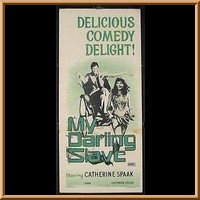
LA SCHIAVA IO CE L’HO E TU, NO (MY DARLING SLAVE)
1. Successful comedy, broad farce, Italian comedy and its qualities?
2. The effect of the structure: flashbacks, marriage, mistress, slave?
3. The characteristics of the Italian hero: male, comic, his work, ambition, relationship with women? Ease for audiences to identify with him?
4. The portrayal of the wife: marriage, rushed, modern, impersonal, mod clothes, taking in the orphans etc.?
5. The contrast with the mistress: her style, flirting, rendezvous, pretended suicide?
6. The humour of the Amazon scheme? The comedy in Brazil?
7. The transformation and westernization of the girl? The comedy inherent in this?
8. The change in Palermo's society? reactions to the slave?
9. The attitude of the law, the hero's demonstration in the streets?
10. The permit and seeking permission: the Bishop and his death?
Published in Movie Reviews
Published in
Movie Reviews
Tagged under
Saturday, 18 September 2021 19:19
My Friend Irma
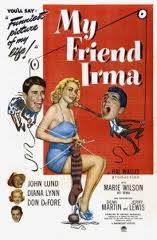
MY FRIEND IRMA
US, 1949, 103 minutes, Black and white.
Marie Wilson, Diana Lynn, John Lund, Don Defore, Dean Martin, Jerry Lewis, Hans Conreid.
Directed by George Marshall.
A routine domestic American comedy of the late forties. It was based on a popular radio series by Cy Howard who wrote the present film. Diana Lynn is a charming heroine as the 'My' of the title. Marie Wilson does her dumb blonde routine entertainingly as Irma.
However, the film was noted for its introducing Dean Martin and Jerry Levis. They are in this film as they are in all their succeeding films. Dean Martinis the pleasant singing hero, Jerry Lewis, the rather zany (for some very childish) little man comedian. The film is an indicator of the popular entertainment of the time and of interest for those who admire Jerry Lewis especially as a comedian and are interested in Dean Martin's career. There was a sequel, My Friend Irma Goes West.
1. An entertaining comedy? Romance?
2. The conventions of American light comedy? Romance? Girls living in apartments and looking for husbands, the sensible girl, the humorous brainless girl, the blonde? The rich businessman, the out of work con-man, the romantic hero, the humorous sidekick? How well embodied wore these conventional characters? Well portrayed? Situation comedy?
3. The film-making styles of the forties? New York? The atmosphere of the city? Work, homes, night clubs, cafe& etc.?
4. The plausibility of the plot? Sufficient for the purposes of the conventions? Contrived, humorous and farcical situations?
5. Jane as the heroine? Her narrative at beginning and end? Credible and attractive? Her apartment and her view of Irma? Her seeking the job with Richard? Her dislike for Al? The encounter with Stove when she was planning a rich marriage? Her fascination with him, her determination to marry Richard? How well was this illustrated in her interviews, outings, dancing, listening to Stove singing etc.? The encounter with Richard's mother? Her decisions? The happy ending?
6. The contrast with Irma? Attractive, falling down man-holes, her mix-ups with words, her devotion to Al? The type of broad American humour that she represented? Her getting involved with Al? Her interfering in people's lives without intending to, her final hurt? her decision to kill herself and the humour of the note? The radio programme and all being well?
7. The portrait of the men in the film? Steve as the partner, taken in by Al, singing ability, charm, success? The contrast with Richard an the typical rich and spoilt executive? A1 and the Damon Runyon type con-man? Seymour and Jerry Lewis's style of comedy? The humorous presentation? Conventional presentation?
8. The quality of the humour? American, of the forties. the radio programme basis, the use of wisecracks, farcical situations, coincidences? How enjoyable were these?
9. Dean Martin and Jerry Levis and their working together, night club styles of singing and patter, Jerry Lewis's style with voice, faces, impersonations? How well did they blend together? Was a successful career indicated by this film?
10. The minor characters - landlady, Richard's mother, the professor and his music-playing, the owners of the night clubs etc.?
11. How dated does this kind of comedy seem? How perennial? Why is the basic material generally entertaining? Insight into the basics of human nature?
Published in Movie Reviews
Published in
Movie Reviews
Tagged under